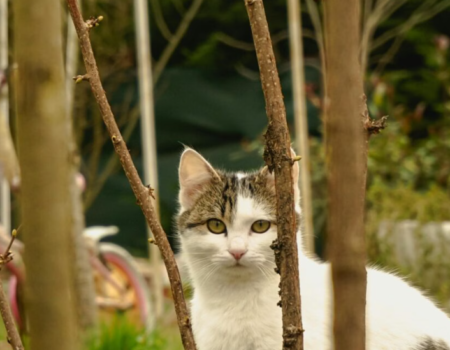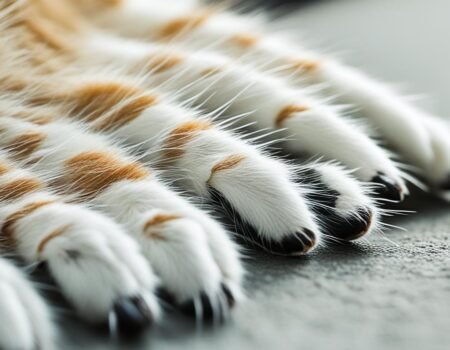“In ancient times, cats were worshipped as gods; they have not forgotten this.” – Terry Pratchett
Have you ever wondered why your beloved feline companion turns into a vocal virtuoso the moment the sun sets? The eerie silence of the night is suddenly pierced by their relentless meowing, leaving you puzzled and sleep-deprived. As a cat owner, I’ve embarked on a mission to understand this nocturnal phenomena and uncover the reasons behind their midnight concerts.
Key Takeaways:
- Cats meow at night for a variety of reasons, including seeking attention, food, or play.
- Stress, territoriality, and changes in their environment can also trigger nighttime meowing.
- Understanding your cat’s body language and vocalizations can provide insight into their needs and emotions.
- Addressing underlying medical issues and providing an enriched environment can help reduce nighttime meowing.
- Introducing a second pet should be carefully considered as a solution for cat meowing at night.
Understanding Cat Behavior and Communication
Cats have their unique ways of communicating, and as cat owners, it’s important to decipher their messages. Through a combination of body language and vocalizations, cats express their moods, emotions, and desires. These forms of communication provide valuable insights into their needs and overall well-being.
One of the most common ways cats communicate is through meowing. However, it’s essential to understand that meowing can have different meanings depending on the context. Cats may meow to seek attention, express hunger, or indicate distress. By paying close attention to the circumstances and accompanying body language, owners can better interpret the meaning behind these vocalizations.
“Cats use different types of tail movements and vocalizations to convey their moods, emotions, and desires.
Cat body language is another crucial aspect of their communication. Tail movements, for example, can reveal a wide range of emotions. A cat with an upright, puffed-up tail may be expressing aggression or fear, while a tail wrapped around your leg signifies affection and trust.
“By observing and understanding their body language, owners can gain insights into their cat’s needs and emotions.”
Other non-verbal cues such as ear position, eye dilation, and body posture also play significant roles in deciphering a cat’s communication. An erect tail, softly flickering ears, and relaxed body posture typically indicate contentment and relaxation. Conversely, flattened ears, dilated pupils, and a tense body suggest discomfort or aggression.
“Cats rely on their body language to convey their intentions, emotions, and even potential threats.”
Understanding a cat’s communication is a valuable tool in building a strong bond with them. It enables owners to respond to their needs appropriately and create a harmonious environment. Recognizing the meaning behind specific behaviors and vocalizations can help address any underlying issues and ensure the cat’s overall well-being.
Observing and interpreting a cat’s body language and vocalizations is an art that can strengthen the bond between owners and their feline companions. By paying attention to their unique communication signals, we can better meet their physical and emotional needs.
Common Reasons for Cat Meowing at Night
Cats can be quite vocal, and their meowing at night can be attributed to a variety of reasons. Understanding these reasons is essential in finding appropriate solutions to address this behavior. Some common reasons for cat meowing at night include:
- Stressors: Cats are sensitive creatures, and changes in their environment can cause them stress. This may include relocation to a new home, the presence of other animals, or even changes in their usual routine. To alleviate the stress and reduce nighttime meowing, it’s important to create a calm and familiar environment for your feline friend.
- Illness: Cats may meow at night if they are unwell or in pain. It’s crucial to rule out any underlying medical conditions that may be causing discomfort or distress. Regular veterinary check-ups and prompt medical attention can help identify and address any health issues your cat may be experiencing.
- Aging: As cats age, their behavior may change, including their meowing patterns. Elderly cats may experience cognitive decline or age-related health issues, leading to increased vocalization at night. Providing extra care and attention to senior cats can help alleviate their anxiety and minimize nighttime meowing.
- Reproductive instincts: Unspayed or unneutered cats may meow at night to attract mates or mark their territory. It’s essential to have your cat spayed or neutered to prevent unwanted behaviors and reduce the likelihood of excessive meowing.
Addressing the specific cause of your cat’s nighttime meowing is key to finding effective solutions. By understanding the reasons behind their behavior, you can provide the necessary support and make adjustments to restore peace and tranquility to your home.
Common Reasons for Cat Meowing at Night
| Reasons | Solutions |
|---|---|
| Stressors | Provide a calm and familiar environment, gradually introduce changes, and offer comfort and reassurance. |
| Illness | Consult a veterinarian, schedule regular check-ups, and ensure prompt medical attention. |
| Aging | Provide extra care and attention to senior cats, consider senior-specific cat food, and create a comfortable environment. |
| Reproductive instincts | Spay or neuter your cat to prevent unwanted behaviors and reduce meowing caused by the desire for mating. |
Understanding the specific reasons behind your cat’s nighttime meowing is essential in developing an effective action plan to address this behavior. By implementing appropriate solutions, you can help your cat feel more secure and reduce excessive meowing at night.
Tips for Dealing with Cat Meowing at Night
If you’re tired of your cat meowing at night and disrupting your sleep, there are several strategies you can try to manage this behavior. By addressing the root causes of your cat’s meowing and implementing some simple solutions, you can restore peace and quiet to your nighttime routine.
1. Playtime Before Bed
Engaging your cat in interactive play sessions before bedtime can help tire them out and promote better sleep. Use toys that simulate hunting behavior, such as wand toys or puzzle toys, to keep your cat active and mentally stimulated. This can help release excess energy and reduce the likelihood of nighttime meowing.
2. Address Hunger and Thirst
Leaving out food and water for your cat before you go to bed can address any hunger or thirst-related meowing. Make sure your cat has access to fresh food and water throughout the night to prevent them from vocalizing their needs.
3. Keep the Litterbox Clean
Uncomfortable or dirty litterboxes can cause cats to meow at night. Make sure to clean the litterbox regularly to provide a clean and comfortable bathroom environment for your cat. This can help reduce meowing caused by discomfort or the need to use the litterbox.
4. Provide Attention and Affection During the Day
If your cat is meowing out of boredom or loneliness, make sure to provide them with plenty of attention and affection during the day. Engage in interactive play, offer cuddle sessions, and provide opportunities for mental stimulation. By meeting your cat’s needs for companionship and interaction during the day, you can help reduce their nighttime meowing.
5. Don’t Reinforce Attention-Seeking Behavior
If your cat’s meowing is attention-seeking behavior, it’s important not to reinforce it by responding every time they meow. Instead, wait for moments of silence or calm and reward your cat with attention and praise. This can help discourage excessive meowing for attention and encourage quieter behavior.
| Solution | Description |
|---|---|
| Playtime Before Bed | Engage your cat in interactive play sessions to tire them out before bedtime. |
| Address Hunger and Thirst | Leave out food and water for your cat to prevent hunger or thirst-related meowing. |
| Keep the Litterbox Clean | Regularly clean the litterbox to provide a comfortable bathroom environment. |
| Provide Attention and Affection | Give your cat plenty of attention and affection during the day to reduce boredom-related meowing. |
| Avoid Reinforcing Attention-Seeking Behavior | Refrain from responding to meowing solely for attention, and reward quiet behavior instead. |
By implementing these tips and being consistent with their application, you can effectively manage and reduce your cat’s meowing at night, creating a peaceful and restful environment for both you and your feline companion.
Addressing Underlying Medical Issues
If your cat has recently started meowing at night, especially if they are an older cat, it is crucial to consult a veterinarian to rule out any underlying medical issues. Excessive meowing can be a symptom of painful conditions, thyroid disease, or cognitive decline in older cats. By addressing and treating these medical issues, you can reduce or even eliminate the meowing behavior.
Table: Common Underlying Medical Issues That Can Cause Nighttime Meowing in Cats
| Medical Issue | Symptoms | Treatment |
|---|---|---|
| Painful conditions | – Restlessness\n- Vocalization\n- Aggression\n- Limping | – Pain management\n- Physical therapy\n- Surgery, if necessary |
| Thyroid disease | – Increased appetite\n- Weight loss\n- Hyperactivity\n- Excessive thirst | – Medication to regulate thyroid function\n- Dietary changes |
| Cognitive decline | – Disorientation\n- Increased vocalization\n- Changes in sleep patterns\n- Decreased grooming | – Environmental enrichment\n- Medication for cognitive support |
Regular veterinary check-ups and early detection of these medical issues can improve your cat’s overall well-being and help restore peace and quiet in your home.
“If your cat’s meowing at night is out of character, it’s wise to consult with a veterinarian to rule out any underlying medical problems that may be causing the behavior.” – Dr. Sarah Johnson, DVM
Creating a Enriched Environment for Your Cat
Ensuring that your cat’s environment is appropriately enriched can help reduce nighttime meowing. Cats, as natural predators, have certain instinctual needs that must be met in order to promote their overall well-being and reduce stress. By providing a stimulating and engaging environment, you can help satisfy these needs and prevent boredom-related meowing.
One way to enrich your cat’s environment is by offering better exercise options. Regular physical activity is essential for cats to burn off excess energy and maintain a healthy weight. Consider providing interactive toys that encourage your cat to engage in play and exercise. This could include puzzle toys that dispense treats or toys that mimic prey animals, stimulating your cat’s natural hunting instincts. Engaging in regular play sessions with your cat can also provide mental and physical stimulation.
Stimulating games can also contribute to a more enriched environment for your cat. Choose toys that encourage mental engagement, such as puzzle toys or treat-dispensing toys. These toys require your cat to think and problem-solve, providing mental stimulation and preventing boredom. You can also rotate toys to keep things interesting and prevent your cat from losing interest.
Additionally, spending quality time with your cat during the day is important to prevent boredom-related meowing at night. Set aside dedicated playtime or grooming sessions to interact with your cat and provide attention and affection. This helps strengthen the bond between you and your cat while addressing their need for social interaction and mental stimulation.
Expert Tip:
Consider creating a dedicated play area for your cat, equipped with scratching posts, climbing towers, and cozy hiding spots. This gives your cat a space to explore and engage in natural behaviors while preventing them from feeling confined or bored.
It’s also important to address any environmental factors that may be causing stress or discomfort for your cat. Ensure that your cat has access to a quiet and safe space where they can retreat and feel secure. Provide comfortable resting areas, such as cat beds or cozy blankets, to promote relaxation. Additionally, make sure the litter box is easily accessible, clean, and in a location that offers privacy.
By creating an enriched environment for your cat, you can help satisfy their natural instincts, promote mental and physical stimulation, and prevent boredom-related meowing at night. Remember, a well-stimulated and happy cat is less likely to exhibit excessive meowing behavior.
Considering Additional Pets for Companionship
While a second pet is not a guaranteed solution for nighttime cat meowing, it can be an option worth considering, especially for young, active cats who crave more exercise and interaction. Introducing a compatible playmate can provide companionship and help fulfill their needs for companionship, exercise, and stimulation. However, it’s crucial to carefully evaluate the dynamics and compatibility between your existing cat and the potential new pet.
Adding a companion to your cat’s life can offer numerous benefits. It can help alleviate boredom, reduce anxiety, and create a more fulfilling environment for both cats. When selecting a new pet, consider factors such as their age, energy level, and temperament. An ideal second pet should possess qualities that complement your cat’s personality and preferences.
Before bringing a new pet home, it’s essential to introduce them gradually and under controlled circumstances to ensure a smooth transition. Start by exchanging scents between the two animals, allowing them to get accustomed to each other’s scent. Then, proceed with supervised face-to-face interactions. Observe their body language and behavior to ensure they are comfortable and not showing signs of aggression or stress.
Remember: patience is key when introducing a new pet. It may take time for your cat and the new companion to establish a harmonious relationship. Be prepared for a period of adjustment and provide plenty of reassurance, love, and individual attention to both cats throughout the process.
Introducing a second pet can significantly enhance the quality of your cat’s life, but it’s vital to ensure that both animals are happy and comfortable in their newfound companionship.
Understanding Cat Vocalizations at Night
Cats are known for their unique vocalizations, especially at night. These feline sounds can range from gentle meows to loud yowls and even chirping noises. As a cat owner, it’s important to understand the meaning behind these vocalizations and how to address any underlying issues.
Meowing is a common form of communication that cats use to interact with their owners. It can serve various purposes, such as expressing hunger, requesting attention, or simply seeking companionship. Cats may meow at night to let their owners know that they need something or to initiate playtime.
“Meowing is my cat’s way of telling me that it’s time for dinner. She has a specific meow that she uses only when she’s hungry!” – Sarah, cat owner
On the other hand, yowling at night might indicate that something is wrong. Cats may yowl when they are in pain, feeling anxious, or experiencing territorial conflicts with other cats. It’s essential to pay attention to the context of the yowling and look for signs of distress or discomfort.
Some cats also make chirping or chattering noises at night, especially when watching birds through a window. This behavior is believed to be an instinctive hunting response. Cats make these sounds as a way to express excitement and anticipation of capturing prey.
Interpreting Cat Vocalizations
Understanding the different vocalizations your cat makes can help you respond appropriately. Here are some guidelines:
- Meowing: If your cat meows at night, assess whether they are seeking attention, food, or playtime. Addressing their needs may help reduce excessive meowing.
- Yowling: If your cat yowls at night, observe for signs of distress or discomfort. If you suspect pain or anxiety, consult a veterinarian for a thorough examination.
- Chirping: If your cat makes chirping noises while watching birds, this behavior is usually harmless and reflects their natural hunting instincts. Enjoy their excitement!
| Vocalization | Meaning |
|---|---|
| Meowing | Requests attention, food, or playtime |
| Yowling | Indicates distress, discomfort, or territorial conflicts |
| Chirping | Reflects excitement and hunting instincts |
Remember, every cat is unique, and their vocalizations may vary. By paying close attention to your cat’s behavior and considering the context, you can better understand what they are trying to communicate. If you have concerns about excessive vocalizations or any unusual behavior, it’s always a good idea to consult with a veterinarian for further guidance.
Conclusion
Excessive cat meowing at night can disrupt the peacefulness of your home. Fortunately, by understanding the underlying causes and taking appropriate measures, you can restore tranquility and create a harmonious environment for both you and your feline companion.
Identifying the specific cause of your cat’s nighttime meowing is crucial. It could be related to stress, medical issues, boredom, or simply their natural behavior. By observing your cat’s behavior closely and consulting with a veterinarian if necessary, you can address the root of the problem.
Once you have identified the cause, take appropriate action to reduce or eliminate excessive meowing. This may involve providing an enriched environment with stimulating toys and activities, addressing any medical conditions, or establishing a consistent routine that meets your cat’s needs. Creating an environment that promotes mental and physical well-being can significantly reduce nighttime meowing and restore peace to your home.
Remember, restoring peacefulness at home is a process that requires patience and understanding. By implementing the strategies discussed in this article and addressing your cat’s specific needs, you can create a serene and tranquil space where both you and your cat can thrive.
FAQ
Why does my cat meow at night?
Cats meow at night for various reasons, including seeking attention, food, or play, feeling distressed or threatened, or experiencing changes in their environment. It’s important to determine the specific cause to address it properly.
How do I understand my cat’s behavior and communication?
Cats communicate through body language, including meowing. By observing their body language, such as tail movements and vocalizations, owners can gain insights into their cats’ needs and emotions.
What are the common reasons for cat meowing at night?
Cats may meow at night due to stress, relocation, illness, changes in behavior, mating instincts, or to assert territory. It’s important to rule out any underlying medical conditions that may be causing the meowing.
How can I deal with my cat’s meowing at night?
Strategies to manage cat meowing at night include playing with your cat before bedtime, addressing hunger or thirst-related meowing by providing food and water, keeping the litterbox clean to prevent discomfort, and providing attention and affection during the day. Avoid responding to attention-seeking meowing to avoid reinforcing the behavior.
Should I be concerned about my cat’s nighttime meowing as a sign of health issues?
If your cat’s nighttime meowing is a new behavior, especially in older cats, it’s important to consult a veterinarian to rule out underlying medical issues. Painful conditions, thyroid disease, and cognitive decline in older cats can contribute to excessive meowing at night.
How can I create an enriched environment for my cat to help reduce nighttime meowing?
Providing better exercise options, stimulating games, and interactive toys can help reduce boredom-related meowing. Spending quality time with your cat during the day and rewarding quiet behavior can also help. Addressing any environmental factors causing stress or discomfort is important.
Should I consider getting a second pet for my cat to reduce nighttime meowing?
While getting a second pet is not generally recommended as a solution for nighttime meowing, it may be an option for young, active cats that require more exercise and interaction. However, compatibility and dynamics between existing and potential pets should be carefully considered.
What are cat vocalizations at night and what do they mean?
Cats make a variety of vocalizations at night, including meowing, yowling, and chirping. Meowing is a common way for cats to communicate with their owners, while yowling may indicate distress or the need for attention. Understanding the context of these sounds can help owners interpret their cat’s behavior.
How can I reduce excessive cat meowing at night and restore peacefulness at home?
By identifying the specific cause of the meowing and addressing it appropriately, owners can help reduce or eliminate excessive meowing at night. Understanding cat behavior, providing an enriched environment, and addressing any underlying medical issues are key steps toward restoring peacefulness at home.











No Comment! Be the first one.